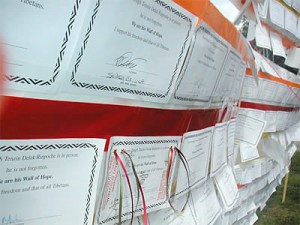
More than 20,000 Messages of Hope were sent in support of Tenzin Delek Rinpoche. Messages came from more than 40 countries from around the world. (www.tibetanyouth.org)
More than 20,000 messages of support for Tenzin Delek are posted on a “Wall of Hope” as a massive expression to Commission delegates that his case must be given high priority during their deliberations and discussions with the Chinese government.
International supporters of Tenzin Delek Rinpoche call for his immediate release pending a new trial conducted in accordance with international due process standards, the immediate release of others arbitrarily arrested in connection with his case, a credible and independent investigation into his arrest and trial; and the prosecution of officials responsible for the violation of his human rights during the process of investigation, detention, trial and imprisonment.
“While the UN Human Rights Commission meets to consider the human rights records of member states, we are compelled to use this opportunity to highlight the urgency of Tenzin Delek’s case and build the international support to secure his release,” said Tsering Jampa, Executive Director of the International Campaign for Tibet-Europe.
April 7, 2004, marks the second anniversary of Tenzin Delek Rinpoche’s arrest in Kardze Tibetan Autonomous Prefecture in connection with two bombings in Sichuan province. He was charged with “incitement to separatism” and “causing explosions.” No evidence links him to these crimes. Denied due process, he was sentenced to death but granted a two-year suspension on December 2, 2002. He is currently being held in Tuandong Prison, Sichuan.
Tenzin Delek declared his innocence at the sentencing hearing. He repeated this claim in a tape smuggled from prison, saying, “I was wrongly accused because I have always been sincere and devoted to the interests and well-being of Tibetans. The Chinese did not like what I did and what I said. That is the only reason why I was arrested.”
Circumstances surrounding his case indicate that the prosecution of Tenzin Delek Rinpoche was politically motivated. His efforts to develop Tibetan institutions — including monasteries, schools and medical facilities — and to limit the exploitation of natural resources in eastern Tibet, were ultimately seen as subversive by local authorities.
His leadership outside the Communist Party made him a political target. “Rinpoche’s story is the story of Tibet today and exposes China’s true intention — to destroy the unique Tibetan identity,” concluded Jampa.

